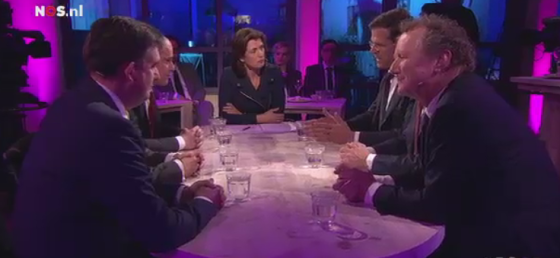Provincial elections: cabinet faces tricky negotiations to find a senate majority
 The ruling coalition in the Netherlands will be faced with the difficult task of putting together a new alliance to ensure controversial legislation gets passed in the senate following Wednesday’s provincial elections.
The ruling coalition in the Netherlands will be faced with the difficult task of putting together a new alliance to ensure controversial legislation gets passed in the senate following Wednesday’s provincial elections.
With over 97% of the votes counted, the VVD and Labour are on course to win just 21 seats in the senate in May. The addition of the three friendly opposition parties – the D66 Liberals and small religious parties SGP and CU – is likely to take the total to 36 – two seats short of an overall majority.
Both D66 and the Christian Democrats, who came third and second in the vote, made it clear on Wednesday night they want to see tax cuts in return for support. Smaller parties, such as GroenLinks and the pro-animal PvdD also said they will be constructive but not uncritical.
Dutch voters elected the members of the 12 provincial councils on Wednesday. The provincial council members will elect the 75 members of the senate in late May.
Splintered
The Financieele Dagblad says Dutch politics have become so splintered the country needs to reform its political system to remain governable.
The biggest loser of the night was the ruling Labour party. The social democrats are likely to have just eight seats in the senate from May, a loss of six.
‘Our battle continues,’ a defiant Labour leader Diederik Samsom told supporters in Amsterdam. ‘We lost but we have not been beaten.’
Coalition
The VVD remains the biggest party, but is on target to drop three senate seats. Despite the coalition losses, prime minister Mark Rutte said he would not change tack. ‘90% of VVD voters want this coalition to continue and that is what we are going to do,’ he said.
Geert Wilders’ anti-Islam PVV failed to capitalise on the rise of radical Islam and lost support for the fourth election in a row. The PVV will have nine seats in the new look senate, a loss of one, having captured around 11% of the vote.
The PVV did, however, retain a narrow lead over D66 as the biggest party in Rotterdam and in Almere. D66 was the biggest party in Amsterdam and tied with the VVD in The Hague.
Provinces
In terms of the provinces, the Socialists are likely to be the biggest in Groningen province, where gas extraction has proved a hot political potato.
The CDA are the biggest party in Friesland, Zeeland and Flevoland and may also take Limburg, where the PVV was the biggest four years ago.
The VVD dominate in Drenthe, Noord-Brabant, Gelderland and Flevoland. Noord and Zuid-Holland may also have the VVD as the biggest party. D66 will take the helm in Utrecht.
A more detailed look at the results will follow later
Thank you for donating to DutchNews.nl.
We could not provide the Dutch News service, and keep it free of charge, without the generous support of our readers. Your donations allow us to report on issues you tell us matter, and provide you with a summary of the most important Dutch news each day.
Make a donation